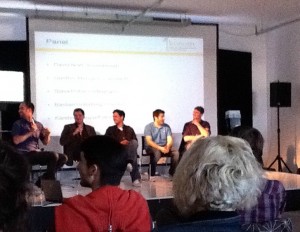Social Media Week Berlin puts Twitter and hot social media topics in context
Which city is most Twitter-happy? Globally: London, according to Twittergrader
Top-Tweeting cities then take a distinct North American focus: LA, Chicago, and then New York. Every top 10 Twittergrader city but London and Sydney are in North America.
Granted, Twitter and Facebook are US companies. And living between Boston (Twitter Grader #8) and New York City, it’s fair to say I’m bathing in the Kool-Aid.
It was, therefore, of great interest to be a part of Social Media Week Berlin. Social Media Week is a global weeklong event, a bit of South by Southwest strung across the planet.
Berlin, according to Twitter Grader, ranks #38 in Twitter usage. It’s interesting to see how each of the 12 cities stacked up for Twitter and social media mentions. Sheldon Levine from Sysomos took a snapshot of #SMW activity for each of the days. I was particularly interested in Thursday, when I presented “How to Get a Job in Social Media.”
What do companies expect you to know already when you’re interviewing? I crowdsourced via LinkedIn Answers and added my own commentary as President of Designated Editor and Social Media Strategies professor at the University of Rhode Island.
While my LinkedIn respondents spanned the globe, there was a Boston-New York bias. And it’s amazing to think how big an influence Boston has: Chris Brogan, David Meerman Scott, HubSpot, SCVNGR, all mentioned.
Yet all met with unfamiliarity in Berlin.
Perhaps Berliners are simply less Twitter-centric?
I found it somewhat heartening that Berlin’s tweets accounted for only about 10% of Social Media Week Tweets. That is, I spoke to a packed room of 75 people +/- and no one had his/her face buried in a smartphone. It was refreshing.
Levin’s snapshot is hugely fascinating, since I’m especially interested in hearing what social media means in non-native-English-speaking countries. Thankfully everyone was spared my faulty German; the presentation was in English.
Turns out there seemed to be quite a variation in social media topics from here to there: My talk could have been subtitled: “What We Talk About in the States When We Talk About Social Media.”
I was only able to attend a few sessions due to my teaching schedule at URI, but was heartened to hear Berliners talk about Open Source and Crowdsourcing and Community Management when they talk about Social Media: much less platform-specific and more tools to serve society better. One talk argued that Venture Capital is strangling Open Source, comparing Capitalism to Socialism.
Berliners, be they German or Auslander, say their city is the Social Media / Entrepreneurial capital of Europe
They may be excluding the UK. Why?
- Cheap rent compared to any other major European city
- Crossroads of Europe
- A city reborn and revitalized
- Vibrant public transit: “You’re 30 minutes from downtown to the rest of the city.”
Having visited Berlin many times in the past 30 years, and attended school there, the international nature nurtured through the Cold War has left the city with a palpable sense of vibrancy.
Where else in Europe, or the world, could you go and get by only on English?
Not just touring around, but having a viable occupation.
Where in Europe has the entire downtown been redefined? Mitte, 30 years ago, was the heart of communism, with decomposing buildings and foreboding No Man’s Land running like a ribbon between the 2 Berlin Walls through the heart of the capital and encircling us.
The former East German capital is a hotbed of hipster hotels (Soho House was once the East German political headquarters), museums, embassies, and parties.
It’s this sense of renewal, youth, and enthusiasm that sparks not just social media innovation but the can-do spirit of entrepreneurs of all stripes. That spirit is fundamental to our American ideals and has a heart beating outside the Bundestag as well.
Long live innovation, wherever it may be.

